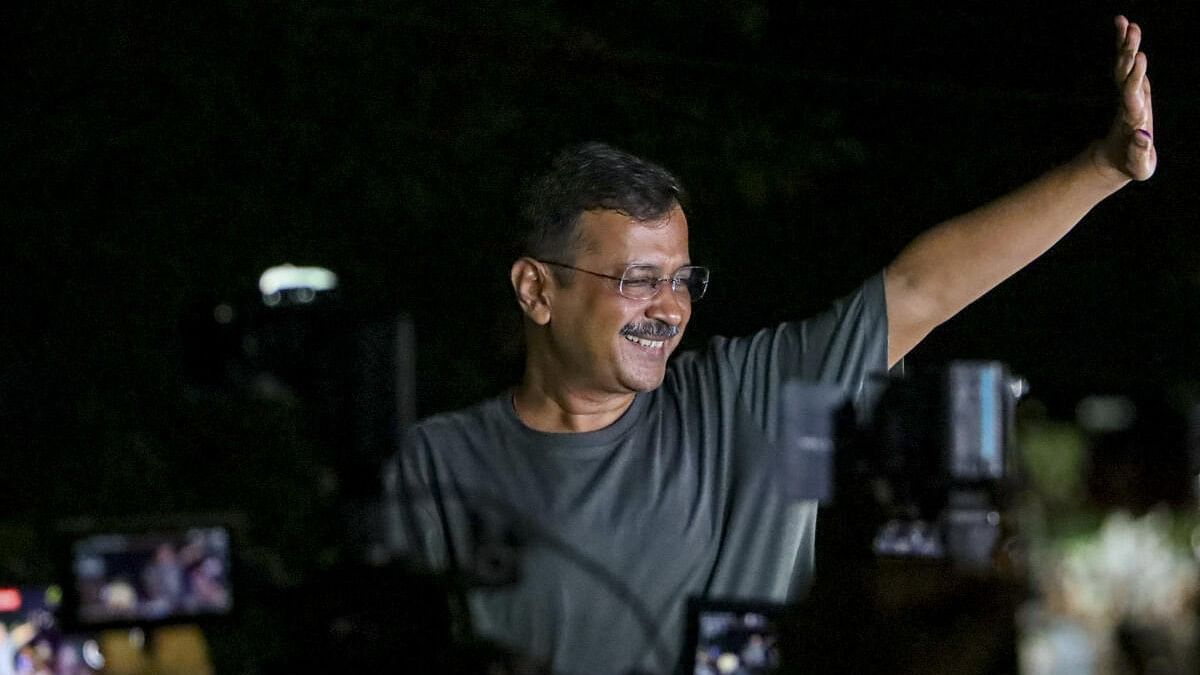
Delhi Chief Minister Arvind Kejriwal acknowledges supporters outside his residence after the Supreme Court (SC) granted him interim bail.
Credit: PTI Photo
Following is the chronology of events in the Delhi excise policy-linked money-laundering case in which the Supreme Court on Friday granted interim bail to Delhi Chief Minister and AAP leader Arvind Kejriwal till June 1 to campaign in the Lok Sabha elections:
* November 2021: Delhi government introduces new excise policy.
* July 2022: Lt Governor VK Saxena recommends Central Bureau of Investigation (CBI) probe into alleged irregularities in formulation and implementation of policy.
* August 2022: CBI and Enforcement Directorate (ED) register cases in connection with alleged irregularities.
* September 2022: Delhi government scraps excise policy.
* October 30, 2023: ED sends first summons to Kejriwal in money-laundering case for appearance on November 2.
* December 2023: ED issues two more summonses to Kejriwal for questioning on December 21 and January 3.
* January 2024: Two more summonses sent to Kejriwal by ED for January 18 and February 2.
* February 3: ED files complaint against Kejriwal before magisterial court for skipping summonses.
* February 7: Magisterial court summons Kejriwal on ED complaint.
* February: ED issues summonses for appearance of Kejriwal on February 19, February 26 and March 4.
* March 7: Magisterial court issues summons to Kejriwal on ED's fresh complaint against him for evading summonses.
* March 15: Sessions court refuses to stay proceedings against Kejriwal for skipping summons.
* March 16: Magisterial court grants bail to Kejriwal in ED's complaints against him for skipping summons after he appears before it.
* March 21: Delhi HC refuses to grant protection from arrest to Kejriwal on his petition challenging summonses issued to him. ED arrests Kejriwal shortly after.
* March 23: Kejriwal moves Delhi HC challenging his arrest by ED and trial court order remanding him in agency's custody.
* April 9: HC dismisses Kejriwal's petition against arrest by ED.
* April 10: Kejriwal moves SC challenging HC order upholding his arrest by ED.
* April 15: SC seeks response from ED by April 24 on Kejriwal's plea challenging his arrest.
* April 24: ED tells SC that Kejriwal led investigating officer through his conduct "to form the satisfaction" that he is guilty of money laundering.
* April 27: Kejriwal tells SC that his "illegal arrest" in case constitutes an unprecedented assault on tenets of democracy based on "free and fair elections" and "federalism".
* April 29: SC questions non-appearance of Kejriwal before ED despite repeated summonses for recording of statements, and asks if he can challenge arrest on grounds of non-recording of his version.
* May 3: SC says it may consider granting interim bail to Kejriwal in view of ongoing Lok Sabha elections.
* May 8: SC says it will pronounce order on interim bail to Kejriwal on May 10.
* May 10: SC grants interim bail to Kejriwal till June 1, says he will have to surrender and go back to jail on June 2.
* May 10: Kejriwal walks out of jail.